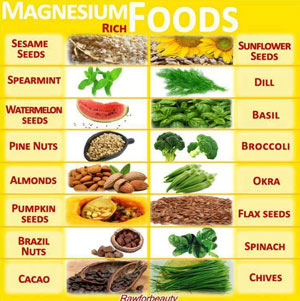Magnesium: Why it’s important and how much do you need?
Are you one of the many consumers that have heard that the mineral magnesium is important for good health — but are not sure why?
If so, you’re not alone. A recent survey shows that 90% of U.S. consumers are aware of magnesium, but 70% don’t know the specific health benefits.
are aware of magnesium, but 70% don’t know the specific health benefits.
You might have heard that a deficiency in magnesium can cause muscle cramps. Also, many are familiar with the over-the-counter constipation remedy “Milk of Magnesia.” But are you one of the 68% of North Americans (are you an expat?) who may be eating the typical SAD (Standard American Diet) and are consuming sub-optimal amounts in your diet?
Magnesium is known as the “energy mineral” and is a cofactor for hundreds of enzymes, involved in more than 300 biochemical reactions. It’s essential for energy production, maintaining normal nerve and muscle function, and supporting a healthy immune system. It’s involved in protein and bone production and maintenance, helps regulate blood glucose levels, and helps keep a steady heartbeat.
 Magnesium is plentiful in a variety of plant and animal foods, and the kidneys regulate magnesium excretion, so that if your dietary intake is less than optimal, the kidneys will limit excretion.
Magnesium is plentiful in a variety of plant and animal foods, and the kidneys regulate magnesium excretion, so that if your dietary intake is less than optimal, the kidneys will limit excretion.
However, certain conditions increase the risk for magnesium deficiency. Low levels could be from not consuming enough in your diet, from malabsorption in the small and large intestines, or from the kidneys over-excreting magnesium.
Gastrointestinal issues, including prolonged diarrhea, Crohn’s disease, celiac disease, and intestinal inflammation due to radiation are linked to magnesium depletion.
Renal disorders and long-term use of diuretics can deplete magnesium.
There are 14 classes of prescription drugs linked to magnesium deficiency including some blood pressure medications, acid blockers (PPIs), antacids, antibiotics, and some statins.
Article continues below graphic.
 Chronic alcohol abuse is linked to moderate and severe magnesium depletion, both because of poor nutrient intake and because alcohol stimulates the kidneys’ excretion of magnesium.
Chronic alcohol abuse is linked to moderate and severe magnesium depletion, both because of poor nutrient intake and because alcohol stimulates the kidneys’ excretion of magnesium.
Studies show that up to 12% of hospitalized patients, and up to 65% of patients in the ICU have low magnesium status.
How To Ascertain Your Magnesium Status? It’s A Problem!
It’s difficult to assess your magnesium status, because only a fraction is circulating in the blood, and the majority is stored in tissues and bones.
Early symptoms of magnesium deficiency may include general malaise, loss of appetite, nausea and vomiting.
Moderate symptoms include numbness and tingling, muscle cramps and contractions, seizures and abnormal heart rhythm… and personality changes.
Severe symptoms include low blood calcium and low potassium.
Chronic low magnesium status is associated with metabolic syndrome, a cluster of symptoms that include high triglycerides, insulin resistance, hypertension, abdominal obesity, and sub-optimal levels of “healthy” HDL cholesterol.
Are you eating enough magnesium-rich foods?
The current recommended intake is 400-420 mg/day for men and 310-320 for women. However, the NHANES (National Health and Nutrition Examination Survey 1999-2000) found that 68% of Americans consumed less than the recommended daily intake and 19% consumed less than half of the recommended daily intake. Adults average only 66% of the Daily Value (DV) for magnesium from foods, which leaves U.S. adults about 100-125 mg deficient.
It’s easy to eat enough magnesium, as long as you make most of your calories from whole foods, not processed ones.
 According to the World’s Healthiest Foods, magnesium is abundant in many whole foods! Best sources are unsweetened cocoa, legumes, nuts, seeds, fish, whole grains, and green leafy vegetables.
According to the World’s Healthiest Foods, magnesium is abundant in many whole foods! Best sources are unsweetened cocoa, legumes, nuts, seeds, fish, whole grains, and green leafy vegetables.
For example, just one cup of cooked spinach (180g) has 157 mg of magnesium, almost 40% of your DV for the day. A 1-oz. (28g) serving of pumpkin or squash seeds also serves 156 mg of magnesium; 2 tablespoons (10g) of unsweetened cocoa powder has 52 mg. Click here for a list of magnesium-rich foods.
Magnesium deficiency may have accelerated in modern times due to agricultural practices that can deplete the soil of the mineral.
However, health experts emphasize that it’s the move away from whole foods to processed foods that most strongly influences magnesium status. Processing removes much of this essential micronutrient. For example, when magnesium-rich safflower seeds are processed into oil, all the magnesium is removed. When wheat flour is processed from whole grain, 80-97% of the magnesium is removed, and unlike other processed staples like rice, magnesium is not added back to “enriched” flour. Molasses contains some valuable nutrients, including vitamin B6, calcium, iron, manganese, and magnesium, but when it’s refined into white table sugar, it’s stripped of all value.
Fortified breakfast cereals are a source of magnesium. And when they’re made from wheat bran (naturally rich in magnesium) they’re a super source. For example, a ½ cup (31g) serving of Kellogg’s All Bran has 132 mg, or 28% of your DV.
Should you supplement?
Taking any vitamin or mineral in excess could wreak havoc with your health. In excess, even the most benign water-soluble B vitamin can have potentially health-compromising side effects.
Your kidneys are the filters that regulate levels of magnesium in your body, and unless you have a renal deficiency or disease, as long as you eat a nutrient-rich diet, you’re likely to stay in balance. To be assured of adequate intake, you might take a daily multivitamin-mineral supplement with 100% of the DV for magnesium and other essential micronutrients. According to ConsumerLab.com, limit your daily intake of magnesium from supplements to 350 mg (the Upper Tolerable Intake Level) to avoid side effects. They advise that magnesium oxide is less expensive but may be less well-absorbed and more likely to cause diarrhea. Magnesium citrate and chloride may be better absorbed with fewer side effects.
WebMD.com writes that eating whole foods is always best. Risks associated with supplements include:
Side effects. Magnesium supplements can cause nausea, cramps, and diarrhea. Magnesium supplements often cause softening of stool.
Interactions. Magnesium supplements may not be safe for people who take diuretics (lasix), heart medicines, or antibiotics. Check with your health care provider if you are taking any medicine before taking magnesium.
Risks. People with diabetes, intestinal disease, heart disease or kidney disease should not take magnesium before speaking with their health care provider.
Overdose. Signs of a magnesium overdose can include nausea, diarrhea, low blood pressure, muscle weakness, and fatigue. At very high doses, magnesium can be fatal.
Author’s note: As a registered dietitian, my goal is communicating current scientific and informational advice and is not a substitute for professional medical advice, diagnosis or treatment. Always seek the advice of your physician or other qualified health provider with any questions you may have regarding a medical condition.
Sources
ConsumerLab.com. Product Review: Magnesium and Calcium-Magnesium Supplements Review. https://www.consumerlab.com/reviews/magnesium-supplement-review/magnesium/
Note: subscription required.
National Institutes of Health: Office of Dietary Supplements. Magnesium Fact Sheet for Consumers. https://ods.od.nih.gov/factsheets/Magnesium-Consumer/
NutraIngredients.com. Survey shows continued widespread confusion about magnesium. https://www.nutraingredients-usa.com/Article/2017/11/22/Survey-shows-continued-widespread-confusion-about-magnesium?utm_source=newsletter_daily&utm_medium=email&utm_campaign=22-Nov-2017&c=BomDoKrQsgB%2FoWNLsNY14krBeq6H2whV&p2=
Oregon State University Linus Pauling Institute Micronutrient Information Center. Magnesium.http://lpi.oregonstate.edu/mic/minerals/magnesium#deficiency
U.S. National Library of Medicine. Medline Plus. Magnesium in diet.https://medlineplus.gov/ency/article/002423.htm
WebMD.com. Magnesium for Health. https://www.webmd.com/diet/supplement-guide-magnesium#1
World’s Healthiest Foods. Magnesium. http://www.whfoods.com/genpage.php?tname=nutrient&dbid=75





















